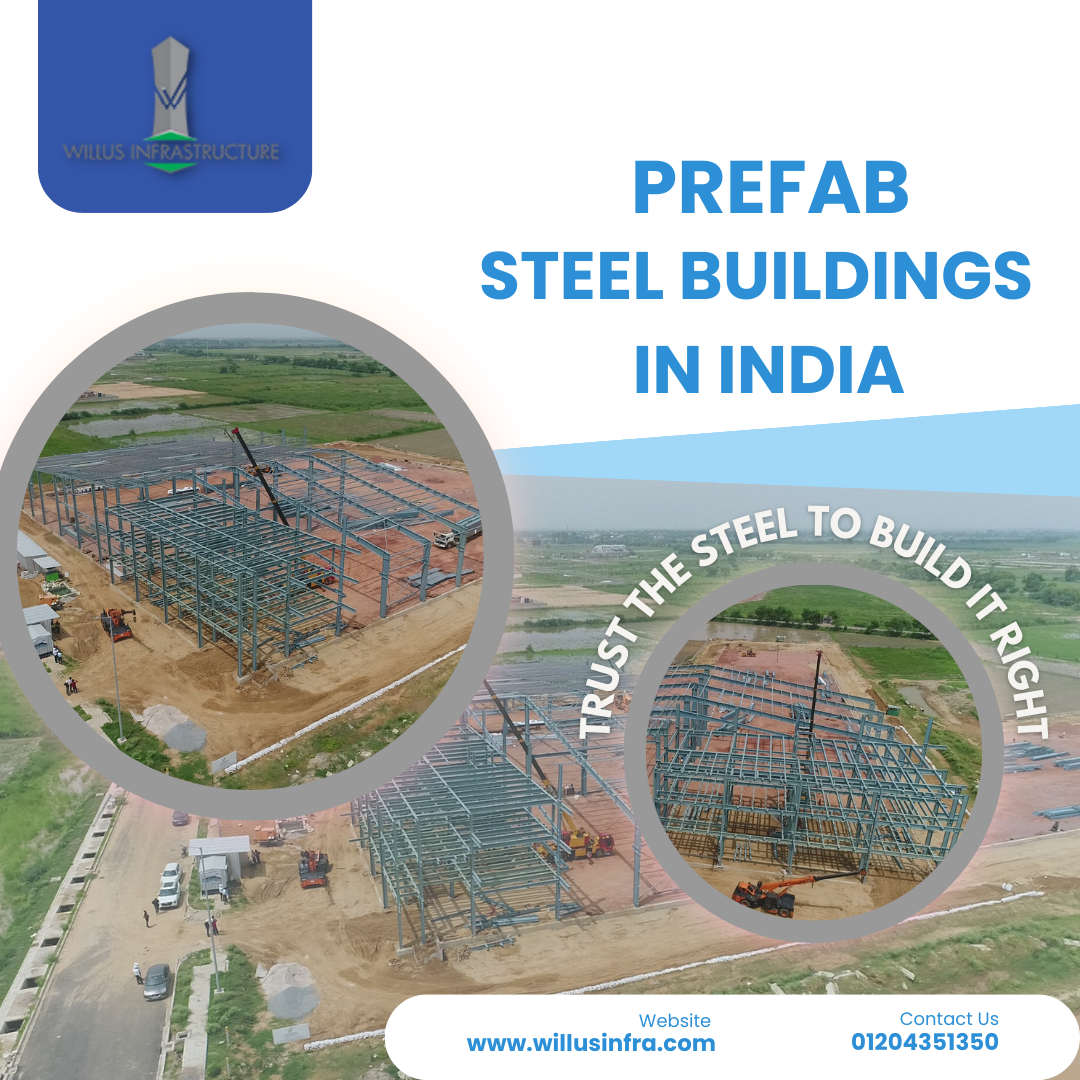Business
Building Better Futures with Prefabricated Buildings in India – Willus Infra
Published
1 year agoon
By
weberalaya
Welcome to the future of construction in India! Gone are the days of traditional brick-and-mortar structures that take months, even years, to complete. Enter Prefab Steel Buildings in India – a modern solution revolutionizing the way we build. With its numerous benefits and innovative approach, prefabricated buildings are paving the way for better infrastructure in India. In this blog post, we will explore how Willus Infra is leading the charge toward creating a brighter future with its cutting-edge prefabrication technology. So fasten your seatbelts and get ready to discover a whole new world of construction possibilities!

The current state of infrastructure in India
India, a country known for its rich heritage and diverse culture, is also grappling with the challenges of infrastructure development. While there have been significant improvements over the years, there is still a long way to go. One of the major issues plaguing India’s infrastructure sector is the time-consuming and costly nature of traditional construction methods.
The demand for housing, schools, hospitals, and other essential facilities has surged exponentially in recent times. However, meeting this demand within stipulated timelines has proven to be quite challenging. The conventional construction process often involves multiple delays due to factors like weather conditions or labor shortages.
Furthermore, the quality of materials used in traditional construction can vary greatly depending on various factors such as sourcing and workmanship. This inconsistency not only compromises structural integrity but also leads to additional maintenance costs in the long run.
In addition to these challenges, urbanization poses another hurdle for India’s infrastructure growth. As more people migrate from rural areas to cities in search of better opportunities, it puts immense pressure on existing resources and services.
To address these issues effectively and efficiently, innovative solutions are needed – enter prefabricated buildings. With their modular design and off-site manufacturing approach, prefabricated buildings offer several advantages over conventional construction methods that can help overcome India’s current infrastructure limitations
The benefits of prefabricated buildings
Prefabricated buildings, also known as modular or pre-engineered structures, offer a range of benefits that make them an attractive option for the construction industry in India. One major advantage is their speed of construction. Since most of the building components are manufactured off-site and then assembled on-site, the overall time required to complete a project is significantly reduced. This allows for quicker occupancy and helps meet tight deadlines.
Another benefit is cost-effectiveness. Prefabricated buildings often require less labor and fewer materials compared to traditional construction methods. This means lower costs without compromising on quality or durability. Additionally, since these structures can be disassembled and relocated if needed, they offer flexibility for future expansion or relocation.
In terms of sustainability, prefabricated buildings are designed with energy efficiency in mind. They can incorporate features such as insulation systems and renewable energy sources to reduce carbon footprint and operating costs over time.
Furthermore, prefabricated buildings have proven to be more resistant to natural disasters like earthquakes or floods due to their strong structural design and use of durable materials.
By choosing prefab buildings in India, individuals and organizations can enjoy faster construction timelines, cost savings without sacrificing quality, sustainability benefits, and increased resilience against natural calamities
Willus Infra’s Vision for India
Willus Infra, a leading provider of prefabricated buildings in India, has a bold vision for the future of infrastructure in the country. With their innovative construction techniques and commitment to sustainability, they aim to revolutionize the way buildings are designed and built.
One key aspect of Willus Infra’s vision is to address the growing need for affordable housing in India. By using prefabricated technology, they can construct high-quality homes at a fraction of the cost and time compared to traditional methods. This not only makes housing more accessible but also helps alleviate some of the strain on urban areas by providing sustainable solutions.
Another important element of Willus Infra’s vision is environmental sustainability. Prefabricated buildings significantly reduce waste during construction as most components are manufactured off-site and assembled on-site. Additionally, these buildings can be designed with energy-efficient features such as insulation and solar panels, further reducing their carbon footprint.
Willus Infra also aims to enhance productivity in the construction industry through streamlined processes and standardized building components. Their state-of-the-art manufacturing facilities ensure consistent quality control while reducing dependency on manual labor-intensive tasks.
By embracing prefabrication technology, Willus Infra envisions a future where India’s infrastructure development is faster, greener, and more cost-effective. Whether it’s housing projects or commercial complexes, their goal is to deliver structures that meet both functional requirements and aesthetic appeal.
With its unwavering commitment to innovation and sustainable practices, Willus Infra continues to shape India’s built environment one prefab building at a time. As demand for efficient construction solutions grows across various sectors, their vision holds immense potential for transforming how we live and work in this rapidly developing nation.
How prefabricated buildings are built
Prefabricated buildings, also known as modular or off-site construction, have gained significant popularity in recent years due to their numerous advantages. So, how are these innovative structures built?
The process begins with careful planning and design. The architectural team works closely with engineers and construction experts to create detailed plans for the prefabricated building. This includes determining the size, layout, and specifications of each module.
Next comes the fabrication stage. In a controlled factory setting, skilled craftsmen construct the modules using high-quality materials such as steel frames, concrete panels, and sustainable insulation. These components are precisely measured and cut to ensure accuracy and efficiency during assembly.
Once complete, the modules are transported to the site where they will be installed. Cranes or trucks carefully lift each module into place according to the pre-determined layout plan. Skilled workers then connect electrical systems, plumbing networks, and other necessary infrastructure.
One of the major advantages of prefabricated steel buildings is the speed of construction. Since much of the building work is done simultaneously at both on-site locations and in factories, project timelines can be significantly reduced compared to traditional construction methods.
In addition to being faster to build though,
prefabricated buildings also offer superior quality control.
With products manufactured indoors under strict supervision,
potential weather-related damages or delays are minimized.
This ensures that every component meets stringent standards,
resulting in a structurally sound and durable building.
Moreover,
the use of standardized designs
allows for cost savings through economies of scale.
Efficient material usage reduces waste,
while streamlined manufacturing processes increase productivity.
These factors contribute towards more affordable housing solutions
and increased accessibility for all segments of society.
By embracing prefabrication technology,
India can revolutionize its approach towards infrastructure development.
Willus Infra envisions a future where sustainable,
affordable yet aesthetically pleasing buildings become commonplace.
Their commitment to innovation coupled with their expertise
in designing customized prefab solutions sets them apart,
making them a reliable partner in the journey towards building better futures.
The process of working with Willus Infra
Working with Willus Infra is a seamless and efficient process that ensures the successful completion of your prefabricated building project in India. From the initial consultation to the final installation, their team of experts is there every step of the way to ensure your vision becomes a reality.
The process begins with an in-depth discussion where you can share your requirements and design preferences. This allows Willus Infra to understand your unique needs and come up with innovative solutions tailored specifically for you.
Once all the details are finalized, their skilled engineers and architects get to work on creating detailed plans and drawings. These designs take into account factors like structural integrity, energy efficiency, and aesthetic appeal.
Next comes the manufacturing phase, where state-of-the-art technologies are used to fabricate each component of the building off-site in a controlled environment. This method guarantees precision and quality control while minimizing construction time on-site.
After manufacturing is complete, all components are transported to your location for assembly. With pre-fabricated buildings, this step is significantly faster compared to traditional construction methods since most of the building elements have already been fabricated off-site.
The final stage involves assembling these components on-site under expert supervision. The skilled technicians at Willus Infra ensure that everything fits together perfectly according to plan. Their attention to detail guarantees a sturdy structure that meets all safety standards while also showcasing exceptional craftsmanship.
Throughout the entire process, constant communication between you and Willus Infra keeps you updated on progress milestones. Any concerns or modifications can be addressed promptly by their knowledgeable team members who prioritize customer satisfaction above all else.
In conclusion (as per request), working with Willus Infra offers many advantages when it comes to constructing prefabricated buildings in India. With their expertise, attention-to-detail approach, advanced manufacturing techniques, and commitment towards meeting customer expectations – they truly stand out as leaders in this industry!
Conclusion
As India continues to develop and strive for better infrastructure, prefabricated buildings offer a promising solution. With their numerous benefits including cost-effectiveness, energy efficiency, and reduced construction time, it’s no wonder why they are gaining popularity in the country.
Willus Infra is at the forefront of this revolution, with their vision to transform India’s construction landscape through innovative prefab solutions. Their commitment to quality and sustainability sets them apart from the rest.
The process of building prefabricated structures involves meticulous planning, design, and manufacturing before on-site assembly. Willus Infra ensures that every step is executed flawlessly to deliver durable and aesthetically pleasing buildings.
Working with Willus Infra is a seamless experience. From concept development to final installation, their team of experts guides clients through each stage of the project. They prioritize customer satisfaction by offering customized designs tailored to specific needs.
Prefabricated buildings have immense potential to shape a better future for India’s infrastructure development. With companies like Willus Infra leading the way, we can expect more efficient construction practices that not only save time and money but also contribute to sustainable growth.
So whether you’re looking for a residential space or commercial establishment – consider embracing prefabrication as your gateway towards a stronger and more prosperous India!
You may like
Business
How Fenugreek Oil for Hair Can Help Control Frizz and Boost Shine
Published
2 weeks agoon
December 9, 2024By
Kaira
Frizzy, unruly hair can be a frustrating issue, leaving your hair looking lackluster and difficult to manage. Many factors contribute to frizz, including humidity, dryness, and damage. Fortunately, fenugreek oil—a natural, plant-based oil extracted from the seeds of the fenugreek plant—offers an excellent solution. Known for its hydrating, nourishing, and repairing properties, fenugreek oil can be a game-changer in controlling frizz and boosting the natural shine of your hair. Here’s how fenugreek oil works wonders for frizz control and adding a healthy, radiant shine to your locks.
1. Deep Hydration to Tame Frizz
Frizz often occurs when hair becomes dehydrated, causing the hair shaft to expand and create a puffy, uneven texture. Fenugreek oil is an excellent natural moisturizer that helps hydrate both the scalp and hair, making it an ideal solution for combating frizz.
Fenugreek oil contains essential fatty acids, including linoleic acid and oleic acid, which help to lock in moisture and seal the hair cuticle. This keeps the hair hydrated, smooth, and less likely to puff up in humid or dry conditions. When used regularly, fenugreek oil can provide a continuous moisture boost to your hair, preventing frizz from forming and ensuring that your hair remains smooth throughout the day.
How to use fenugreek oil for frizz control:
- After washing your hair, apply a few drops of fenugreek oil to damp hair, focusing on the mid-lengths and ends.
- Gently distribute the oil using your fingers or a wide-tooth comb.
- Allow your hair to air dry or blow dry as usual. The oil will help seal moisture into your hair, leaving it sleek and frizz-free.
2. Smoothing the Hair Cuticle
The outer layer of the hair, known as the cuticle, is made up of overlapping scales. When these scales are lifted or damaged, it can cause the hair to appear frizzy, rough, and dull. Fenugreek oil works to smooth the hair cuticle, helping to flatten the scales and reduce the appearance of frizz.
The protein-rich nature of fenugreek oil, along with its vitamin B complex and lecithin content, helps to strengthen the hair shaft and repair damage to the cuticle. By improving the smoothness and integrity of the hair cuticle, fenugreek oil prevents frizz from forming and promotes a sleek, polished look.
How to apply fenugreek oil for cuticle smoothing:
- Warm a few drops of fenugreek oil in your palms and apply it to your hair, starting from the ends and working your way up.
- Avoid applying too much product to the roots to prevent greasy buildup.
- For an added shine boost, use a small amount of fenugreek oil as a finishing touch after styling to tame flyaways and smooth any remaining frizz.
3. Adding Natural Shine to Your Hair
In addition to controlling frizz, fenugreek oil is known for enhancing the natural shine of your hair. This shine is a result of fenugreek oil’s ability to seal in moisture, making your hair appear more hydrated, glossy, and vibrant. When the hair is well-moisturized and smooth, it reflects light better, giving it a natural shine.
The oil’s fatty acids also help reduce the buildup of excess sebum on the scalp, which can weigh down the hair and make it look greasy. By keeping your hair hydrated without leaving it greasy, fenugreek oil helps maintain a balance that contributes to a healthy, glossy finish.
How to boost shine with fenugreek oil:
- Add a few drops of fenugreek oil to your regular shampoo or conditioner.
- For a finishing touch, apply a small amount of fenugreek oil to your hair after styling to add a glossy sheen.
- Use the oil on your damp hair to enhance its natural shine and prevent dullness.
4. Protecting Hair from Damage and Humidity
Humidity is one of the primary culprits behind frizz, as it causes the hair shaft to swell and become puffy. Fenugreek oil acts as a protective barrier, helping to prevent moisture from the air from entering the hair shaft. This barrier effect keeps the hair hydrated from within and prevents the outside environment from affecting the smoothness of your hair.
Additionally, fenugreek oil’s antioxidant properties, thanks to compounds like vitamin C and flavonoids, help protect hair from environmental stressors like pollution and UV rays, which can contribute to both dryness and frizz. By shielding your hair from damage, fenugreek oil ensures that your locks stay soft, shiny, and frizz-free.
How to use fenugreek oil as a protective barrier:
- Apply a small amount of fenugreek oil to your hair before heading out into humid conditions or after styling.
- Use it as part of your regular hair care routine to maintain a smooth, frizz-free finish, no matter the weather.
5. Preventing Split Ends and Breakage
Frequent heat styling, chemical treatments, and environmental factors can lead to split ends and hair breakage, both of which can contribute to frizz. Fenugreek oil helps to prevent split ends by nourishing and strengthening the hair shaft, making it less likely to snap or fray.
The proteins and antioxidants in fenugreek oil help to repair damaged hair and improve its overall resilience. When hair is stronger and less prone to breakage, it maintains its smooth texture, reducing the chance of frizz.
How to use fenugreek oil for split ends prevention:
- Apply a small amount of fenugreek oil directly to the ends of your hair after washing and conditioning.
- Use it as a leave-in treatment to help prevent split ends and promote healthier, stronger hair over time.
Conclusion
Fenugreek oil for hair is a powerful, all-natural solution for controlling frizz and boosting shine. With its ability to deeply hydrate the hair, smooth the cuticle, and protect against damage and humidity, fenugreek oil can help you achieve sleek, shiny, and frizz-free hair. Whether used as a leave-in treatment, finishing product, or part of a deeper hair care routine, fenugreek oil provides the nourishment and protection your hair needs to stay healthy, shiny, and frizz-free. By incorporating fenugreek oil into your regular hair care routine, you can enjoy smooth, vibrant, and manageable hair every day.
Business
The Role Of Medical Evidence In TPD Claims: How To Build A Strong Case
Published
4 weeks agoon
November 27, 2024By
danielclarke
Total and Permanent Disability (TPD) claims offer essential financial support to individuals who can no longer work due to illness or injury. However, comprehensive medical evidence is vital to secure a favourable outcome in a TPD super claim. TPD claims hinge on the ability to demonstrate through medical documentation that a condition prevents indefinite employment.
Collecting strong medical evidence to support your TPD claim is a challenging process, but it’s crucial for your case. Here, working with experienced legal professionals like TPD solicitors can ensure claimants compile the strongest case possible.
To know more about the role of medical evidence in TPD claims and how to build a strong case, keep reading this article.
Understanding TPD Claims and Medical Evidence
In a TPD claim, medical evidence serves as the foundation to substantiate the claimant’s inability to return to work. TPD insurance providers require clear documentation that the claimant’s condition is permanent and severely impacts their ability to work in their current occupation or any other suitable employment. Medical evidence may include detailed medical records, diagnostic reports, treatment histories, and statements from specialists, all contributing to building a strong case.
The strength of a TPD claim rests on presenting objective medical proof that aligns with the requirements set by insurers. Each insurance policy has its specific requirements and definitions of “total and permanent disability,” so understanding these details with the help of TPD claims Sydney professionals ensures that medical evidence meets those criteria effectively.
Types of Medical Evidence Essential for TPD Claims
When filing a TPD claim, various forms of medical evidence play a critical role. Primary sources include medical reports from treating doctors, specialist assessments, and any relevant psychological evaluations. Here’s a closer look at some of the critical types of medical evidence that can strengthen a TPD claim:
- General Practitioner (GP) Reports: A report from a GP is often the first point of reference in TPD claims. The GP’s records provide a comprehensive view of the claimant’s medical history, including past treatments and long-term care plans. Detailed reports from a GP can illustrate the ongoing effects of the condition on daily activities and work capacity.
- Specialist Reports: Specialist assessments provide a more in-depth understanding of the claimant’s condition, diagnosis, and prognosis. A specialist in the relevant medical field can attest to the severity and permanence of the condition, which is often a decisive factor in TPD claims. Consulting TPD lawyers in Parramatta can help identify relevant specialists and ensure the documentation meets legal and policy standards.
- Functional Capacity Evaluations (FCEs): In many TPD claims, insurers require functional capacity evaluations to assess whether the claimant can perform basic physical or mental job functions. An FCE conducted by a certified healthcare provider demonstrates the claimant’s physical limitations or mental impairments, substantiating claims of total and permanent disability.
- Psychological and Psychiatric Reports: Psychological or psychiatric evaluations are vital for claimants whose disabilities stem from mental health conditions. These reports should detail the symptoms, treatment plans, and long-term impact on work capacity. Mental health evidence can be particularly persuasive when structured according to the insurer’s criteria, which TPD solicitors in Sydney can help clarify.
Steps to Strengthen Medical Evidence in TPD Claims
To maximise the effectiveness of medical evidence, consider these steps:
- Document All Treatment History: Maintaining comprehensive records of all medical appointments, treatments, and prescribed medications helps establish the persistence and seriousness of the condition. Insurers value this detailed history as it shows that the claimant has actively sought treatment and medical advice to manage their condition.
- Seek Regular Specialist Consultations: While a GP can provide a broad overview, regular specialist consultations ensure expert insights support the claim. Specialists’ reports hold significant weight, especially when they come from professionals with substantial experience in treating similar conditions.
- Ensure Consistency in Medical Records: Insurers may scrutinise medical records for inconsistencies. It is crucial to ensure that all medical documents, statements, and reports consistently reflect the same information about the condition. Discrepancies can weaken the case, so it is recommended to double-check all evidence for uniformity.
- Collaborate with Legal Experts for Guidance: TPD claims can involve complex legal language, policy conditions, and specific criteria that must be met. Experienced TPD professionals can review medical evidence, ensuring all necessary documents are collected, complete, and compelling.
- Obtain Additional Supportive Evidence: In some cases, additional supporting documents, such as personal statements from family members, colleagues, or former employers, can enhance the claim. These statements can describe the visible impact of the condition on the claimant’s daily life, complementing medical reports.
The Role of TPD Lawyers in Strengthening a Case
Building a strong TPD case involves collecting medical records, understanding which evidence is relevant, interpreting policy conditions, and effectively presenting documentation. TPD lawyers are skilled at navigating these complexities and know what specific evidence insurers prioritise. They can also facilitate communication between medical providers and insurers, ensuring that the information provided meets insurer expectations and policy definitions.
Moreover, TPD solicitors can anticipate potential objections from insurers. Some insurers may seek additional information or question the permanence of a disability, especially if it involves a fluctuating condition. Legal professionals can prepare counter-evidence or challenge assessments, bolstering the case’s strength.
Conclusion:
Medical evidence is the backbone of a successful TPD claim, providing the objective proof needed to demonstrate the extent and permanence of a claimant’s disability. Thus, assembling comprehensive and consistent medical evidence is essential. By following these guidelines, claimants can build a solid foundation for their TPD superclaim, improving their chances of securing the financial support they need. Consulting experienced TPD lawyers can further enhance the case, ensuring all aspects are thoroughly addressed and presented effectively to insurers.
Business
The Pros and Cons of Renting a Storage Unit: Is It Right for You?
Published
4 weeks agoon
November 27, 2024By
danielclarke
Renting a storage unit has become a popular choice for individuals and businesses facing space constraints or in need of secure, accessible storage. Whether it’s for seasonal items, business inventory, or moving purposes, a storage unit offers flexibility and control over belongings.
As convenient as it sounds, renting a storage unit isn’t a one-size-fits-all solution. To decide if this option fits your needs, let’s explore the benefits and drawbacks of renting a storage unit, the types of self-storage solutions available, and how to find the best option for you.
Why Consider Renting a Storage Unit?
The appeal of storage units lies in their ability to provide extra space, security, and peace of mind. For those overwhelmed with clutter or seasonal items or lack storage space at home, a storage unit can be a lifesaver. Understanding the trade-offs of renting is essential for making an informed choice.
What Are the Benefits of a Storage Unit?
- Extra Space and Organisation: The most immediate advantage of renting a storage unit is its extra space. This option helps declutter your home, creating a more organised living environment without discarding items that may be valuable or hold sentimental value. For businesses, extra space for inventory can streamline operations and allow for easy scaling without investing in costly commercial property.
- Secure Storage for Valuables: Modern storage facilities prioritise security with features such as surveillance cameras, gated access, and on-site staff. This makes them an ideal option for safeguarding valuable or irreplaceable items. For individuals who travel frequently or live in shared spaces, having a secure storage unit can be invaluable in keeping possessions safe.
- Flexible Self-Storage Solutions: Many facilities offer a range of unit sizes and types, catering to diverse needs. Climate-controlled storage units protect temperature-sensitive items like electronics, furniture, and documents from humidity and extreme temperatures. 24/7 access storage units also allow customers to retrieve their belongings anytime. This is helpful for business owners who may need off-hours access.
- Temporary Storage During Life Transitions: Life events like moving, renovating, or expanding a family often require temporary storage. Renting a unit during these transitions can provide a reliable place to store items without the pressure of deciding what to keep or discard immediately. The flexibility of short-term and month-to-month leases makes it an adaptable solution.
Pros of Renting Storage Units
- Convenient Access: With options for 24/7 access storage units, renters have the flexibility to access their belongings at any time, which can be particularly useful for business inventory or personal items stored off-site.
- Cost-Effective for Short-Term Needs: Storage units are often more affordable than larger apartments or commercial leases for people facing temporary space constraints, such as during a move.
- Adaptable Space Options: Storage facilities often provide units in various sizes, making it easy to scale up or down as needed. Seasonal equipment, sports gear, and holiday decorations are common items stored here, freeing up valuable home space.
What Are the Drawbacks of Renting a Storage Unit?
- Monthly Costs Add Up: Renting a storage unit can be a recurring expense, and costs vary based on size, location, and amenities. For those looking to store items long-term, it’s essential to weigh the monthly fees against the value of the items. Over time, storage fees can add up, and sometimes the expense may outweigh the convenience.
- Potential for Clutter: While a storage unit can help declutter your home, it can also lead to an “out of sight, out of mind” mindset. Without a system for periodically reviewing stored items, storage units may become an accumulation of items that are rarely, if ever, used. This can result in paying for space filled with items that might be better sold, donated, or discarded.
- Limited Climate Control in Basic Units: Basic storage units are not climate-controlled, which means items like wood furniture, electronics, and delicate fabrics may be susceptible to damage from humidity, extreme temperatures, or pests. For those storing valuable or sensitive items, opting for climate-controlled storage is essential but may come at a higher price.
- Distance and Accessibility: Unlike home storage, accessing items in a rented storage unit requires travel. While facilities are generally located conveniently, retrieval still requires some planning. If items in storage are needed frequently, the inconvenience can outweigh the benefits of storing them off-site.
How to Decide if Renting a Storage Unit is Right for You
- Assess Your Needs: Take a close look at what you need to store, how long you expect to store it, and how often you’ll need access. If your storage needs are temporary or seasonal, renting might be ideal. However, if you’re considering long-term storage, ensure that the cost aligns with the value of the items being stored.
- Consider the Types of Storage Units: Storage facilities, like those at Storage Units Coffs Harbour, often offer varied options, from standard to climate-controlled units and 24/7 access storage. Climate-controlled storage may be necessary for items like artwork or electronics to prevent damage, especially in regions with extreme weather.
- Factor in Location and Accessibility: Choose a storage facility close to home or work if you need regular access. Otherwise, opting for a more affordable facility farther away might make sense if access is less frequent. Facilities with 24/7 access benefit for business owners needing off-hours entry to their inventory.
- Evaluate Costs and Long-Term Value: Monthly storage fees can range widely, so comparing rates and contracts is crucial. Calculate the total cost if you plan to store items for the long term. Sometimes, the cumulative cost of storage may exceed the value of the items stored, making it more practical to downsize belongings or find alternative storage options.
Conclusion
Renting a storage unit can be a practical solution for those needing extra space, secure storage, or temporary accommodations for their belongings. The costs, potential for clutter, and need for careful planning mean it’s essential to test whether it’s the right choice. By assessing your storage needs, selecting the appropriate type of unit, and reviewing costs, you can make an informed decision that maximises the benefits while minimising the drawbacks. Storage units offer a balance of convenience and security. But as with any investment, it’s best to ensure it aligns with your unique needs and budget.

Who is Natalie Viscuso? Unveiling the Life, Career, and Achievements of a Rising Star

MogStation: The Ultimate Guide to Square Enix’s Digital Store for Final Fantasy XIV

Fintechzoom: A Comprehensive Guide to the Fintech Industry and Its Impact

Get your Canadian visa in a jiffy – Hong Kong citizens can now apply online!
BiharMasti: The Place to Download Bhojpuri Movies and Music

How do MEP Services help contractors?
Trending
-

 Business2 years ago
Business2 years agoGet your Canadian visa in a jiffy – Hong Kong citizens can now apply online!
-

 Tips & Tricks2 years ago
Tips & Tricks2 years agoBiharMasti: The Place to Download Bhojpuri Movies and Music
-

 Business2 years ago
Business2 years agoHow do MEP Services help contractors?
-

 Law2 years ago
Law2 years agoWhat states have no chase law for motorcycles
-

 Business2 years ago
Business2 years agoEverything You Need to Know About SQM Club
-

 Technology2 years ago
Technology2 years agoHow to do Jio Prepaid Recharge Online
-

 Game1 year ago
Game1 year agoOvertime Megan Leaks: Understanding the Controversy
-

 Politics2 years ago
Politics2 years ago6 Ideas You Can Steal from Election Results

